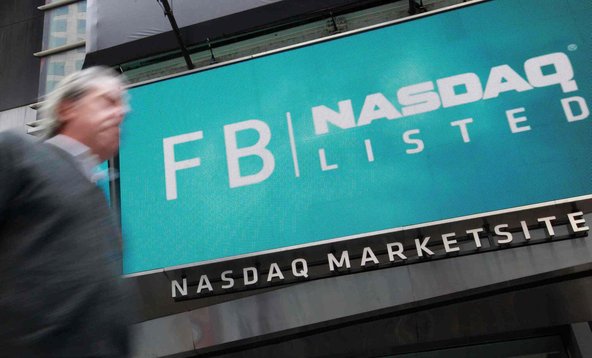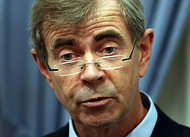 Brendan Mcdermid/Reuters Facebook on the NASDAQ Marketsite.
Brendan Mcdermid/Reuters Facebook on the NASDAQ Marketsite.
Just days before Facebook went public, some big investors got nervous about the social network.
After publicly warning about challenges in mobile advertising, Facebook executives held conference calls to update their banks’ analysts on the business. Armed with the new information, analysts at Morgan Stanley and other firms started reaching out to their clients to dial back expectations for the Internet company.
One prospective investor was told that second-quarter revenue could be 5 percent lower than the bank’s earlier estimates. Another analyst warned that revenue could be light for the next two years.
As investors tried to digest the developments, Morgan Stanley was busy setting the price and the size of the I.P.O.
While some big institutions chose not to buy the stock, others placed large orders. And retail investors, who weren’t necessarily privy to the same information, continued to clamor for shares.
 John Tlumacki/Boston GlobeWilliam Galvin, the Massachusetts secretary of state.
John Tlumacki/Boston GlobeWilliam Galvin, the Massachusetts secretary of state.
In the end, Morgan Stanley bankers decided they had enough demand and interest for Facebook to justify an offering price of $38 a share.
They didn’t.
When Facebook went public on May 18, shares of the social networking company barely budged — and they have been falling every since. On Tuesday, the stock closed at $31, more than 18 percent below its offering price.
The I.P.O. of Facebook was supposed to be Morgan Stanley’s crowning achievement. The bank had helped usher in a new era of technology companies, leading the offerings of LinkedIn, Groupon, Pandora and more than a dozen other start-ups over the past year.
Facebook was poised to be the biggest and most ambitious. When the dust settles, Morgan Stanley could make more than $100 million on the I.P.O.
But Morgan Stanley may have given the market more than it can chew. Rival bankers and big investors have complained that Morgan Stanley botched the I.P.O., setting the price too high and selling too many shares to the public.
In a statement on Tuesday evening, Morgan Stanley said that it followed the same procedures for the Facebook offering as it does for all I.P.O.’s
Facebook’s fate as a public company is hardly sealed. Many newly public companies stumble out of the gate and later become top performing stocks, including Amazon.com.
But Facebook’s troubled debut raises questions about the I.P.O. process.
Regulators are concerned, in part, that banks may have shared information with certain clients, rather than broadly with investors. On Tuesday, William Galvin, Massachusetts’ secretary of state, subpoenaed Morgan Stanley over discussions with investors about Facebook’s I.P.O. The Financial Industry Regulatory Authority, Wall Street’s self regulator, is also looking into the matter.
“If true, the allegations are a matter of regulatory concern to Finra” and the Securities and Exchange Commision, Richard G. Ketchum, the chief executive of Finra said in a statement.
Morgan Stanley said in its statement:
After Facebook released a revised S-1 filing on May 9 providing additional guidance with respect to business trends, a copy of the amendment was forwarded to all of Morgan Stanley’s institutional and retail investors and the amendment was widely publicized in the press at the time. In response to the information about business trends, a significant number of research analysts in the syndicate who were participating in investor education reduced their earnings views to reflect their estimate of the impact of the new information. These revised views were taken into account in the pricing of the I.P.O.
Article source: http://dealbook.nytimes.com/2012/05/22/facebook-i-p-o-raises-regulatory-concerns/?partner=rss&emc=rss
Speak Your Mind
You must be logged in to post a comment.